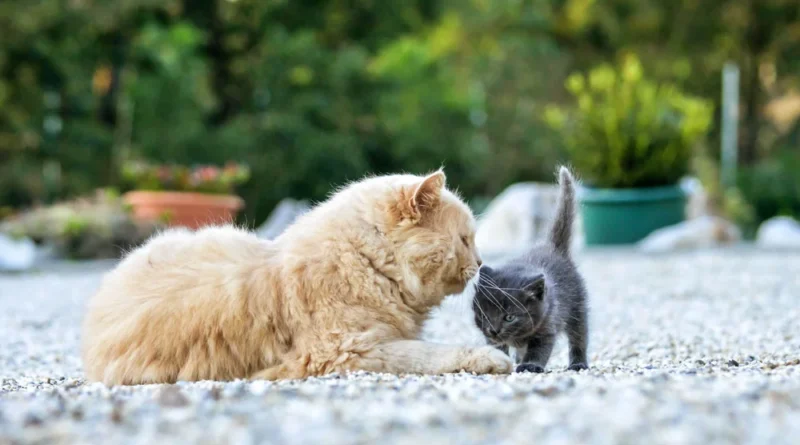How Long is a Cat Pregnant
How Long is a Cat Pregnant:
A cat’s pregnancy generally lasts around 63 to 67 days, approximately nine weeks. Throughout this period, your cat will undergo significant changes as she prepares to bring new kittens into the world.
How to Tell if Your Cat is Pregnant
Identifying a cat’s pregnancy can be challenging, especially early on. Here are a few signs to look for:
- Nipple Changes: One of the earliest indicators of pregnancy is a change in your cat’s nipples, which become larger and pinker—a process known as “pinking up.”
- Weight Gain: As the kittens develop, your cat’s abdomen will expand, giving her a rounder appearance.
- Behavioral Changes: Some cats may become more affectionate and seek extra attention, while others might prefer to spend more time alone.
- Increased Appetite: Pregnant cats typically eat more to meet the nutritional demands of their growing kittens.
If you suspect your cat is pregnant, visit the veterinarian, who can confirm the pregnancy. Around the fourth or fifth week, the vet can feel the developing kittens or use an ultrasound for verification.
Understanding the Stages of Cat Pregnancy
Cat pregnancy is typically divided into three stages:
- Early Pregnancy (Weeks 1-3): During the initial stage, the embryos implant in the uterus and begin to develop. Physical changes are subtle, though some cats might experience mild morning sickness.
- Mid-Pregnancy (Weeks 4-6): This is when pregnancy becomes more noticeable. The kittens are growing rapidly, and your cat’s belly will begin to expand. Behavioral changes, such as increased appetite or nesting instincts, may also become evident.
- Late Pregnancy (Weeks 7-9): During this stage, the kittens are nearly fully developed. Your cat will be visibly larger, and her nesting behavior will intensify as she prepares for labor. Make sure she has a quiet, comfortable space where she can safely give birth.
Essential Tips for Taking Care of a Pregnant Cat
Caring for a pregnant cat involves giving her the right diet, a stress-free environment, and regular veterinary care:
- Proper Nutrition: Feed your cat high-quality kitten food, which provides the extra nutrients she needs during pregnancy.
- Regular Vet Visits: Regular check-ups are crucial to monitor the health of both the mother and the developing kittens.
- Calm Environment: Maintain a peaceful environment for your cat. Avoid any significant changes in her surroundings that could cause stress.
- Gentle Handling: While it’s fine to pet your pregnant cat, avoid excessive handling, especially as her due date approaches.
Preparing for the Arrival of Kittens
As the due date approaches, it’s important to make sure everything is ready for the kittens’ arrival:
- Nesting Area: Create a cozy, private space where your cat can give birth. A cardboard box lined with soft blankets in a quiet area of your home is ideal.
- Necessary Supplies: Stock up on kitten food and keep clean towels on hand for the birth. These will be useful if you need assistance with the delivery.
- Close Observation: Keep a close eye on your cat as the due date nears. Watch for signs that she’s preparing to give birth, such as spending more time in her nesting area or losing interest in food.
Signs Your Cat is Ready to Give Birth
Recognizing when your cat is about to give birth will help you prepare for the arrival of the kittens. Here are some signs to look for:
- Nesting Instincts: Your cat will start searching for a quiet, safe place to have her kittens.
- Loss of Appetite: Many cats stop eating or eat significantly less a day or two before labor begins.
- Increased Grooming: Your cat might groom herself more frequently, particularly around her belly and genital area, as she prepares for delivery.
- Restlessness: As labor approaches, some cats may become more restless, pacing around or frequently changing positions.
- Contractions: You may notice your cat’s abdomen contracting as the kittens move into position for birth.
Wanna Know: Is Cinnamon Bad For Cats
Post-Birth Care for the Mother and Kittens
After the kittens are born, both the mother and her new babies require special care:
- Warmth: Ensure that the kittens stay warm, as they cannot regulate their own body temperature. Keep the nesting area cozy and free from drafts.
- Nursing: The kittens should begin nursing soon after birth. The mother’s first milk, colostrum, is vital for their immune system.
- Health Monitoring: Watch both the mother and the kittens closely for any signs of health issues. If the mother seems unwell or if any kittens are not nursing properly, consult your veterinarian immediately.
- Support: Provide the mother with plenty of food and water, and give her the peace and quiet she needs to care for her kittens.
By following these steps, you can help ensure that your cat has a healthy pregnancy, a smooth delivery, and a strong start for her kittens.

